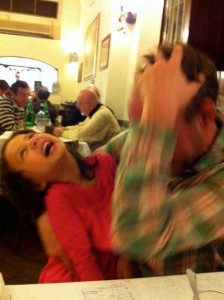
My seatmate for 24 hours or so.
One recent morning, as I walked toward Rangoon’s Shwedagon Pagoda—a Buddhist temple clad in 60 tons of gold and ornamented with precious gems—I was surrounded by children. Goddamn children. Maybe half a dozen of them. All seemed to be about 6 years old, and all were gamboling around, trying to beg money from me, either by selling crap I didn’t want or by offering to change crisp U.S. dollar bills for filthy wads of kyat, the local currency.
For a few minutes I ignored them, then I tried politely to brush them away, and then, when it got to be too annoying, I remembered something. Dropping my voice an octave, I turned to one boy and said, with absolute authority, “That’s enough!” The kid turned away and left me alone.
This was, of course, the same voice I use with Sasha when she gets out of control, when she runs far ahead of me on the way home from school, when she just turns too silly to deal with. In fact, as the Burmese child disappeared into the market area, I wondered why I hadn’t brought out The Voice before, and then I realized: After almost a week away from home, I was losing my parenting skills—i.e., my ability to connect with and manipulate young children.
This, perhaps, was a good thing. As a bearded 30-something man traveling solo in Southeast Asia, I was better off staying away from young children. But after days of being away from Sasha, I missed her presence enough that I started staring at other families—and they back at me.
One afternoon, at an open-air tea shop in downtown Rangoon, I glanced to my left and saw a gap-toothed 5-year-old Muslim girl staring at me. “She is very interesting in you,” said her father, who told me about his work (traveling to Singapore, Malaysia, and Indonesia) and his homesickness while his kid played Giggle at the Foreigner. When they left, I realized I wouldn’t be home in Brooklyn for another 10 days.
But I didn’t have to wait quite that long for another kid encounter. When I finally boarded my flight home, I was overjoyed to realize that I’d be sitting next to a woman roughly my age—and her 4-year-old son, an adorable, sweet kid deeply addicted to asking “Why?” Yes, I was probably the first human being ever to be happy at the prospect of sitting next to a preschooler on a nearly 24-hour halfway-around-the-world journey, but there it is. For the duration of the flight, I talked to the mom and joked with the well-behaved kid, prompting him at one point to say, “Mommy. Mommy! He’s funny!” At last! Someone to appreciate my sense of humor.
All of which provided a nice easing-back-in when I eventually got home—while Sasha and Jean were out shopping, as it happened. When they, too, returned home, Sasha looked a bit bewildered. While I’d been relearning how to be a dad in mid-air, she now had to figure out how to be my daughter. It didn’t take long.



